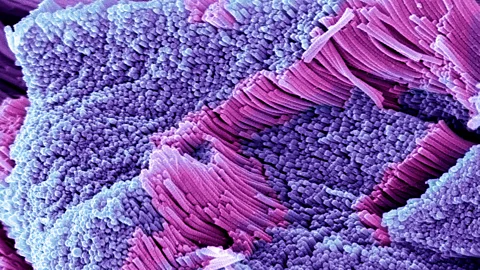

Getty Images
Collagen supplements may enhance skin elasticity—though the evidence remains inconclusive.
The content in this column is for informational purposes only and is not a substitute for professional medical advice. Always consult your healthcare provider regarding any health concerns.
Collagen is often regarded as a miracle substance. This vital protein contributes significantly to the structure of skin and joints and has been touted as a solution for everything from wrinkles to sleep difficulties.
As the body’s most prevalent protein, collagen production naturally declines with age, regardless of sun protection. This has contributed to the growing popularity of collagen supplements, making it a burgeoning market. Bryan Johnson, a tech entrepreneur and advocate for longevity, claims to consume 25g (0.9 ounces) of collagen peptides daily in his quest for a longer life.
Despite its popularity, collagen is often misunderstood. Some studies suggest that supplements may offer health benefits, yet research is still limited. While the main risk associated with supplements is likely financial—given their few known side effects—do the scientific findings support the expansive marketing claims?
Why Collagen is Confusing
To clarify, “collagen is exclusive to animal connective tissue,” explains Andrea Soares, a registered dietitian based in Georgia, US, who is affiliated with the Top Nutrition Coaching network, which connects individuals with local dietitians.
Collagen products are sourced from various animals, including cows, pigs, chickens, and fish. Gelatin, used in producing sweets, jellies, and pharmaceutical capsules, is a form of collagen. “Some plant-based products are marketed as ‘vegan collagen,’ but they actually consist of nutrients that promote the body’s collagen production—such as vitamin C, amino acids, and minerals,” mentions Soares. “If you’re a vegan, investing in a balanced diet could be a wiser choice than purchasing ‘collagen’ supplements containing none.”
Different collagen types behave distinctly in the body. Hydrolyzed collagen (collagen hydrolysate) is fragmented into short chains called peptides, which continue to break down during digestion. Conversely, undenatured (raw) type II collagen forms a component of cartilage around joints. It may potentially replenish joint collagen when consumed, although both forms are broken down into amino acids. Generally, hydrolyzed collagen is better absorbed by the body.

Getty Images
In addition to the different sources and forms of collagen, it is also available in various formats, ranging from bars to beverages. Compared to powders and liquids, “tablets and gummies usually provide less collagen per serving and may include added sugars or fillers,” Soares cautions. While foods rich in protein and vitamin C are beneficial for collagen synthesis, the amount of collagen in items such as bone broth can vary. She recommends those opting for collagen supplements select powders or liquids containing at least 5-10g (0.2-0.4 ounces) per serving.
Overall, many marketing claims surrounding collagen products lack substantial evidence. In the European Union, “no health assertions regarding collagen supplements have been validated,” states Leng Heng, a senior scientific officer at the European Food Safety Authority (EFSA).
EFSA, which evaluates risks associated with novel foods, assessed collagen and concluded that the health claims made regarding it have insufficient high-quality backing. They were either poorly defined, lacked human study support, or relied on animal and laboratory research, which cannot accurately predict effects in humans, says Heng. Assertions like collagen’s role in maintaining skin elasticity or enhancing joint function have not yet been sufficiently validated by scientific findings.
Concerns about individual bias in research are significant, according to Hunter. Many collagen studies are sponsored by supplement companies or involve authors affiliated with these firms. While conflicts of interest should be acknowledged in academic publications, this doesn’t always occur. For instance, a published study had five of seven authors linked to supplement companies, yet offered no detailed conflict information. In response to a BBC inquiry, the publisher Elsevier stated that this paper is currently under investigation.
As Hunter points out, finding studies completely free from industry influence can be challenging. Influencers may promote low-quality studies and suggest higher dosages than recommended by health experts. Even larger reviews that aggregate multiple studies can be tainted by the quality of the original research used.

Getty Images
Research commissioned by the European Commission explored whether collagen or gelatin could trigger new cases of transmissible spongiform encephalopathy (TSE, or prion disease). EFSA estimated the oral exposure of humans to infected gelatin under hypothetical worst-case scenarios, discovering no significant risk.
Collagen for Skin, Tissue, and Joints
A major issue regarding the claims about collagen’s benefits is what occurs when it is ingested. As noted by London dermatologist Anjali Mahto, there’s “limited solid evidence that it survives digestion, enters the bloodstream, and effectively reaches the skin.” When proteins, including collagen, enter the stomach, they are typically broken down into amino acids, which are then reconstituted into the proteins that the body requires at that time. Thus, if collagen is needed, the body may use these amino acids to produce it, but this is not guaranteed.
Nonetheless, many individuals report positive changes in their skin’s appearance and texture attributed to collagen. A systematic review concluded that hydrolyzed collagen can yield favorable outcomes for skin, enhancing its hydration and elasticity. However, the authors stressed that further investigation is essential for validation.
There are approaches to enhance the potential advantages of collagen supplements, especially for tendons. Robert Erskine, a neuromuscular physiology expert at Liverpool John Moores University, suggests that exercise might stimulate increased collagen regeneration in body tissues, which could fortify tendons and reduce the risk of falls.
In a study led by Erskine, researchers investigated whether hydrolyzed collagen could enhance collagen production in response to high-intensity strength training. The study, which involved a small group of healthy young men, revealed that those drinking a blend of vitamin C and 30g (1 ounce) of hydrolyzed collagen prior to exercise significantly increased collagen synthesis. This dosage exceeds what is typically recommended for consumers.

Getty Images
Erskine is particularly keen to research ways to enhance athlete wellbeing and performance, especially for female athletes. He believes collagen may play a significant role not only in performance improvement but also in lowering injury rates. Although this area of research is still growing and somewhat limited, it is being embraced by elite athletes’ nutritional practices.
Although collagen is often linked to youth, athleticism, and aesthetics, it is increasingly studied as a potential remedy for age-related chronic conditions. For instance, the effects of collagen on rheumatoid arthritis symptoms remain unclear, as recent analyses show the overall quality of research in this area is inadequate, preventing definitive conclusions. Some studies have also reported adverse effects.
When assessing osteoarthritis, Hunter and his team performed a systematic review revealing that collagen supplements might alleviate osteoarthritis-related pain in the short term.
Should You Consider Taking a Collagen Supplement?
As with any supplement, there is a risk of interactions with other medications. Therefore, Hunter advises consulting with a healthcare professional prior to starting any new supplement regimen. For individuals with kidney or liver conditions that affect protein metabolism, heightened protein intake may pose concerns, according to Erskine.
Many of Hunter’s patients express interest in supplements after being exposed to various forms of media. “Health professionals must remain open to these conversations,” he insists. “If they are dismissive, patients might pursue these products regardless of expert advice.”
In his practice, Hunter suggests trialing certain supplements for three to four weeks. Research indicates that benefits related to skin and joints might not manifest for a couple of months, but individuals with osteoarthritis may struggle to continue if effects are not seen within a month.
Ultimately, whether a collagen supplement is beneficial can vary based on individual motivations, duration of use, affordability, combination with other ingredients, and its effects on overall health. “Individuals may respond differently to collagen supplements,” notes Erskine.
Many experts argue that the hundreds of pounds spent annually on collagen supplements could be better invested in a more balanced diet, which would confer numerous health benefits. Beyond a nutritious, varied diet, exercise, adequate sleep, and sun protection have well-established positive impacts on skin health and appearance. While it may appear mundane, such choices can yield considerable savings in the long run.
For reliable insights on health and wellness grounded in science, subscribe to the Health Fix Newsletter, while The Essential List delivers an assortment of curated features and insights.










